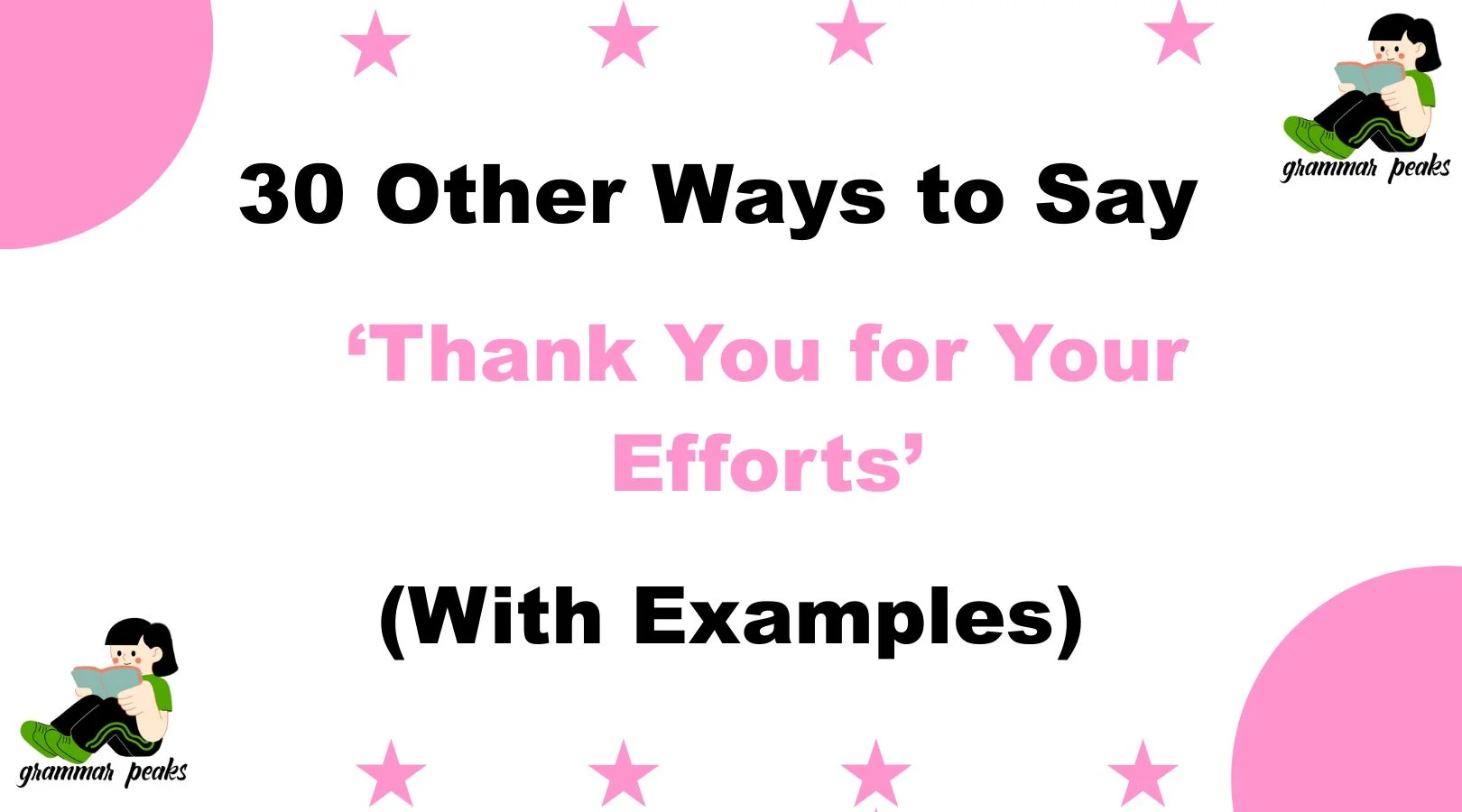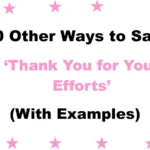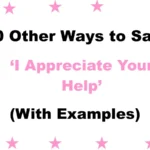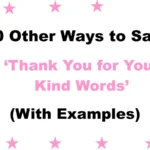In today’s fast-moving professional world, genuine appreciation matters more than ever. Whether you’re leading a team, managing clients, or collaborating with colleagues, the way you say “thank you for your efforts” can impact morale, trust, and connection. The right words do more than show gratitude—they make people feel valued, seen, and respected.
This guide gives you 30 polished, professional, and thoughtful alternatives that help you express appreciation with clarity and warmth. These phrases are crafted to sound genuine, supportive, and context-appropriate, helping your message feel more personal—even in formal settings.
What Does “Thank You for Your Efforts” Mean?
“Thank you for your efforts” is a courteous phrase used to acknowledge someone’s time, energy, and commitment. It’s a respectful way to recognise hard work, whether or not the result met expectations. At its core, this phrase tells the recipient: “I see your dedication, and I appreciate what you put into it.”
In professional settings, it offers positive reinforcement, helps maintain morale, and encourages continued collaboration. It’s especially useful when team members go the extra mile, take initiative, or simply show up with consistency and care.
When to Use “Thank You for Your Efforts”
- After a project completion
- During performance reviews
- When progress is made
- In team updates or reports
Is It Professional or Polite to Say “Thank You for Your Efforts”?
Absolutely. “Thank you for your efforts” is both professional and polite. It’s a workplace-friendly expression of gratitude that shows respect and acknowledgment. It doesn’t overpromise or exaggerate—it simply communicates that you’ve noticed and valued someone’s contribution.
Because it’s formal yet warm, it works well across industries and seniority levels—from direct reports to executives, clients, and contractors.
Pros or Cons of Saying “Thank You for Your Efforts”
Pros:
- Professional and appropriate in nearly all workplace settings
- Motivates continued effort by recognizing contribution
- Clear and respectful tone that maintains boundaries
- Flexible across cultures and communication styles
Cons:
- Can feel generic if overused without personalization
- Might be perceived as neutral rather than enthusiastic
- Lacks emotional depth if the situation calls for deeper recognition
Synonyms for “Thank You for Your Efforts”
- I appreciate your dedication
- Your hard work hasn’t gone unnoticed
- I value the energy you’ve put in
- Your commitment means a lot
- Thanks for going above and beyond
- I’m grateful for your contribution
- Your efforts truly matter
- Thank you for your consistent support
- I respect the time you invested
- You’ve made a real difference
- Your work ethic is impressive
- I’m thankful for your attention to detail
- Your contribution helped move things forward
- I appreciate the thought you put into this
- You gave this your best
- Thanks for sticking with it
- You’ve handled this with professionalism
- I noticed your effort, and I appreciate it
- You brought real value to the table
- That was a job well done
- Thanks for stepping up
- You’ve shown real commitment
- That took dedication—thank you
- I’m impressed with how you handled this
- You’ve helped push us forward
- Thank you for your active participation
- You’ve really supported the team
- I appreciate your focus and effort
- Thanks for your hands-on support
- You gave it your all—thank you
1. I appreciate your dedication
Definition: This phrase expresses gratitude for someone’s consistent effort and loyalty.
Detailed Explanation: It emphasizes the ongoing nature of the person’s contribution rather than just a one-time act.
Scenario Example: I appreciate your dedication during the last few weeks of the campaign launch.
Best Use: When someone stays committed to a long-term task.
Worst Use: For small, one-off tasks that didn’t require much involvement.
Tone: Warm, respectful, and affirming
2. Your hard work hasn’t gone unnoticed
Definition: A way of letting someone know their efforts are seen and valued.
Detailed Explanation: This phrase acknowledges that while the person might not have received immediate feedback, their contribution was recognized.
Scenario Example: Your hard work hasn’t gone unnoticed on this tight deadline—we really appreciate it.
Best Use: When someone has been quietly or steadily contributing over time.
Worst Use: When results were negative or incomplete—it may sound insincere.
Tone: Encouraging, validating, sincere
3. I value the energy you’ve put in
Definition: Acknowledges the emotional, mental, or physical effort someone has given.
Detailed Explanation: This phrase goes beyond actions and focuses on the intention and drive behind the work.
Scenario Example: I value the energy you’ve put in to help bring this idea to life.
Best Use: For collaborative, creative, or people-driven efforts.
Worst Use: When addressing procedural or transactional work—it may sound overly emotional.
Tone: Personal, appreciative, thoughtful
4. Your commitment means a lot
Definition: Recognizes the personal investment someone made in a task or goal.
Detailed Explanation: It shows that their steady involvement and presence didn’t go unnoticed.
Scenario Example: Your commitment means a lot to the success of this project.
Best Use: When someone has consistently shown up, stayed involved, or supported a cause.
Worst Use: For tasks completed quickly without much engagement.
Tone: Sincere, grounded, respectful
5. Thanks for going above and beyond
Definition: Expresses gratitude for exceeding expectations.
Detailed Explanation: This phrase is used when someone puts in more effort than required or anticipated.
Scenario Example: Thanks for going above and beyond to resolve those client issues over the weekend.
Best Use: When someone takes extra initiative or makes a sacrifice.
Worst Use: When expectations weren’t met—it can feel ironic.
Tone: Grateful, impressed, motivating
6. I’m grateful for your contribution
Definition: A polite way to thank someone for what they added to a task, project, or discussion.
Detailed Explanation: This phrase acknowledges the value of someone’s specific role or action, showing that their presence or work made a positive impact.
Scenario Example: I’m grateful for your contribution during today’s strategy meeting—it helped clarify our next steps.
Best Use: When someone plays a supporting or advisory role in a collaborative effort.
Worst Use: When the person was barely involved or not aligned with the result.
Tone: Professional, warm, and appreciative
7. Your efforts truly matter
Definition: A sincere statement emphasizing that someone’s hard work holds real value.
Detailed Explanation: This phrase helps people feel that their contributions are meaningful, even if the outcome isn’t dramatic or immediate.
Scenario Example: Your efforts truly matter—this report helped our team make smarter decisions.
Best Use: When morale is low or the team needs reinforcement that their work is seen.
Worst Use: In formal reports or legal documents—it’s a bit too emotional.
Tone: Reassuring, heartfelt, and affirming
8. Thank you for your consistent support
Definition: Thanks someone not just for what they did, but for showing up time and time again.
Detailed Explanation: It highlights dependability and reliability, which are often overlooked but crucial in any organization.
Scenario Example: Thank you for your consistent support throughout the merger process—it helped us stay grounded.
Best Use: For colleagues or staff who offer ongoing help or steady presence.
Worst Use: For one-time tasks or short-term collaborations.
Tone: Steady, loyal, and professional
9. I respect the time you invested
Definition: Communicates admiration for the hours or effort put in, even if results are still pending.
Detailed Explanation: It shifts focus from outcome to the effort and sacrifice someone made to contribute.
Scenario Example: I respect the time you invested in refining the training manual.
Best Use: In time-intensive or behind-the-scenes work where output may not be immediately visible.
Worst Use: In fast-moving settings where time was not a major factor.
Tone: Respectful, thoughtful, and measured
10. You’ve made a real difference
Definition: Acknowledges that the person’s contribution changed something significantly for the better.
Detailed Explanation: This powerful phrase reinforces that their efforts had impact, encouraging continued excellence.
Scenario Example: You’ve made a real difference in how our clients experience onboarding.
Best Use: In major milestones, client-facing roles, or transformation projects.
Worst Use: For routine or unchanged results—it may sound exaggerated.
Tone: Inspirational, confident, and validating
11. Your work ethic is impressive
Definition: A compliment that recognizes someone’s strong discipline and commitment.
Detailed Explanation: This phrase goes beyond a single task and speaks to the person’s overall professionalism and drive.
Scenario Example: Your work ethic is impressive—handling both projects with precision and focus.
Best Use: During performance reviews or promotions.
Worst Use: When addressing those who struggled with deadlines or productivity.
Tone: Formal, praising, and motivating
12. I’m thankful for your attention to detail
Definition: Thanks someone for their precision, accuracy, and thoughtful focus on the little things.
Detailed Explanation: It recognizes the effort behind quality work that prevents errors or enhances results.
Scenario Example: I’m thankful for your attention to detail in the presentation—it looked flawless.
Best Use: When accuracy and precision were vital to the task’s success.
Worst Use: In roles or tasks where speed or flexibility mattered more than precision.
Tone: Exact, professional, and appreciative
13. Your contribution helped move things forward
Definition: Acknowledges that someone’s action created progress or resolution.
Detailed Explanation: It shows that the contribution had a direct effect on momentum, even if it was a small step.
Scenario Example: Your contribution helped move things forward with the vendor contract—thank you.
Best Use: When progress was slow or a breakthrough was needed.
Worst Use: For tasks that had no noticeable impact.
Tone: Encouraging, action-focused, positive
14. I appreciate the thought you put into this
Definition: Thanks someone for being intentional and thoughtful in their approach or delivery.
Detailed Explanation: This phrase highlights not just the action, but the care and mental energy behind it.
Scenario Example: I appreciate the thought you put into the proposal layout—it flows really well.
Best Use: For creative, strategic, or sensitive work.
Worst Use: For rushed or poorly executed tasks.
Tone: Kind, reflective, personal
15. You gave this your best
Definition: A sincere way of recognizing full effort, even if outcomes weren’t perfect.
Detailed Explanation: This phrase focuses on the integrity of trying hard, which is often just as important as winning.
Scenario Example: You gave this your best, and it showed in the final product.
Best Use: When effort exceeded results, but commitment was strong.
Worst Use: When feedback must be critical or when accountability is needed.
Tone: Encouraging, empathetic, forgiving
16. Thanks for sticking with it
Definition: A casual yet genuine way to thank someone for their persistence.
Detailed Explanation: This phrase acknowledges resilience, especially when a task becomes tedious or challenging over time. It communicates that their dedication didn’t go unnoticed.
Scenario Example: Thanks for sticking with it during the system outage—it made a big difference.
Best Use: When a person shows patience and endurance through tough or prolonged situations.
Worst Use: When used too lightly or sarcastically—it can come off dismissive.
Tone: Friendly, appreciative, resilient
17. You’ve handled this with professionalism
Definition: A respectful acknowledgment of someone’s mature and composed approach.
Detailed Explanation: This phrase is perfect when someone remains composed under stress or manages conflict diplomatically. It reinforces trustworthiness and capability.
Scenario Example: You’ve handled this with professionalism during the budget review—it didn’t go unnoticed.
Best Use: In high-stakes situations or when dealing with difficult clients, feedback, or transitions.
Worst Use: For casual contributions where professionalism wasn’t a concern.
Tone: Formal, respectful, confidence-building
18. I noticed your effort, and I appreciate it
Definition: A personalized way of saying, “I see you”—recognizing unseen or small acts.
Detailed Explanation: People often feel overlooked. This phrase shows personal awareness and human connection, especially for those who don’t typically get recognition.
Scenario Example: I noticed your effort, and I appreciate it—you handled the follow-ups efficiently.
Best Use: When you want to make someone feel seen and valued, especially behind the scenes.
Worst Use: When effort was clearly lacking or results were subpar.
Tone: Warm, personal, and direct
19. You brought real value to the table
Definition: A strong phrase that confirms someone’s insight or input mattered.
Detailed Explanation: This phrase works well for team meetings, strategy discussions, or client planning where a person’s ideas helped steer the direction.
Scenario Example: You brought real value to the table with that competitive analysis—thank you.
Best Use: In collaborative settings where decisions are shaped by multiple viewpoints.
Worst Use: When contribution was minimal or obligatory.
Tone: Confident, positive, validating
20. That was a job well done
Definition: A simple yet effective expression for solid, quality work.
Detailed Explanation: This classic phrase works best when the output clearly meets or exceeds expectations. It signals satisfaction and encourages repeated performance.
Scenario Example: That was a job well done—the event ran smoothly, thanks to you.
Best Use: After completed projects, milestones, or tasks with visible outcomes.
Worst Use: For incomplete work or situations that still require corrections.
Tone: Straightforward, appreciative, approving
21. Thanks for stepping up
Definition: Thanks to someone for taking initiative when needed.
Detailed Explanation: This is great when a person volunteers, fills in for someone else, or takes responsibility without being asked. It encourages leadership.
Scenario Example: Thanks for stepping up to cover the presentation—your support was essential.
Best Use: In moments when someone fills a gap, especially unexpectedly.
Worst Use: If it wasn’t a voluntary effort or the person felt forced into the task.
Tone: Encouraging, appreciative, motivating
22. You’ve shown real commitment
Definition: Highlights someone’s dedication over time, not just a one-time action.
Detailed Explanation: This phrase is ideal for those who go above and beyond consistently. It shows you recognize their long-term loyalty or ownership.
Scenario Example: You’ve shown real commitment throughout this client launch—thank you.
Best Use: For long-term projects, loyal team members, or extended efforts.
Worst Use: After short-term or minimum involvement.
Tone: Respectful, serious, validating
23. That took dedication—thank you
Definition: A more emotional way to express appreciation for deep effort and perseverance.
Detailed Explanation: It emphasizes the personal sacrifice or focus someone gave. This phrase tells them you noticed what they put into it, beyond just time.
Scenario Example: That took dedication—thank you for staying late every day this week.
Best Use: After tasks that required extra hours, energy, or emotional investment.
Worst Use: When the person clearly did not go beyond the minimum.
Tone: Appreciative, heartfelt, and sincere
24. I’m impressed with how you handled this
Definition: A respectful statement expressing admiration for execution and grace.
Detailed Explanation: Great for feedback situations where a person performed with calm, speed, or strategic thinking. It’s respectful and motivating.
Scenario Example: I’m impressed with how you handled this last-minute change—it looked effortless.
Best Use: When the person displayed skill or poise during a tough situation.
Worst Use: When said sarcastically or without context—it can feel passive-aggressive.
Tone: Uplifting, respectful, and measured
25. You’ve helped push us forward
Definition: Thanks someone for their role in creating momentum for the team or project.
Detailed Explanation: This is a great team-building phrase. It shows their contribution had a ripple effect beyond their immediate task.
Scenario Example: You’ve helped push us forward with your insights in this planning phase.
Best Use: In collaborative environments or long-term initiatives.
Worst Use: When efforts stalled or added friction to progress.
Tone: Motivational, inclusive, appreciative
26. Thank you for your active participation
Definition: Appreciates someone for engaging, asking questions, or contributing ideas.
Detailed Explanation: This is a useful professional phrase when engagement or collaboration is expected, especially in training, workshops, or brainstorming.
Scenario Example: Thank you for your active participation in today’s team session—it helped move things forward.
Best Use: In interactive settings, meetings, or learning environments.
Worst Use: For passive participants or those who weren’t involved.
Tone: Professional, engaging, and energizing
27. You’ve really supported the team
Definition: Highlights someone’s role in keeping the group balanced, strong, or functional.
Detailed Explanation: This phrase recognizes behind-the-scenes support, coordination, or team-first mentality. It’s excellent for unsung heroes.
Scenario Example: You’ve really supported the team during the transition—thank you for always being available.
Best Use: For collaborative players, team leaders, or staff in transitional periods.
Worst Use: When someone worked in isolation or resisted team goals.
Tone: Supportive, warm, collaborative
28. I appreciate your focus and effort
Definition: Recognizes both concentration and hard work.
Detailed Explanation: Sometimes people are scattered, but this thanks someone for being attentive and thorough. Great for productivity-focused environments.
Scenario Example: I appreciate your focus and effort on the audit—it kept everything on track.
Best Use: When someone prioritized tasks well and delivered efficiently.
Worst Use: When mistakes happened due to lack of attention.
Tone: Direct, respectful, and professional
29. Thanks for your hands-on support
Definition: Recognizes physical or practical help given directly and actively.
Detailed Explanation: Use this phrase when someone wasn’t just offering advice—they got involved and helped directly. Perfect for teamwork-heavy roles.
Scenario Example: Thanks for your hands-on support with the client demo—you made it easier to execute.
Best Use: In event work, training, fieldwork, or tech support.
Worst Use: For people who only contributed ideas but not action.
Tone: Active, grounded, and appreciative
30. You gave it your all—thank you
Definition: A heartfelt way to say you noticed someone’s total effort and dedication.
Detailed Explanation: This is especially meaningful when results were uncertain but the passion was undeniable. It’s a humanizing and uplifting phrase.
Scenario Example: You gave it your all—thank you for making the product launch successful despite the crunch.
Best Use: When someone showed passion, urgency, and commitment beyond expectations.
Worst Use: When effort was minimal or passive.
Tone: Warm, inspirational, and sincere
Conclusion
Finding the right words to say “Thank you for your efforts” can transform the way your message is received—both professionally and personally. Whether you’re addressing a colleague, team member, or collaborator, using a phrase that feels authentic, warm, and tailored shows that you’re truly present in the conversation.
These 30 thoughtful alternatives go beyond a basic thank-you. They show that you notice the specific ways people contribute, step up, and support goals. Language matters—especially in leadership, teamwork, and moments that call for encouragement. With the right expression, you don’t just acknowledge effort—you build motivation, loyalty, and human connection.
FAQs
1. What is a more professional way to say “Thank you for your efforts”?
A more professional phrase could be “Your contribution is greatly appreciated” or “I value the work you put into this.” These versions still feel kind, but they sound more polished in formal settings.
2. Can I use these alternatives in emails and performance reviews?
Absolutely. Many of these phrases are perfect for written communication, including emails, performance reviews, and formal reports. They help you show specific recognition in a natural, professional tone.
3. How do I choose the right phrase for the situation?
Focus on the tone, context, and effort level. For example, say “You gave it your all—thank you” for intense dedication, or “Thanks for your hands-on support” if someone physically helped. Match the phrase to how the person contributed.
4. Are these phrases suitable for leadership or managerial roles?
Yes, especially so. Leaders who communicate appreciation clearly tend to build better trust and team morale. Using these alternatives shows you’re observant and emotionally intelligent, which strengthens leadership impact.
5. Is it okay to use these phrases in casual settings?
Definitely. While many are business-appropriate, others like “Thanks for sticking with it” or “You brought real value to the table” work great in personal or informal situations too. They carry warmth without being overly formal.

Mia Rose is a passionate Language Coach and Contributor at GrammarPeaks, where she specializes in practical grammar tips and language learning strategies. With a strong foundation in education and communication, Mia brings a friendly, approachable style to her writing. Her goal is to make complex grammar rules simple and usable for learners at any level, helping them grow in both confidence and fluency.





